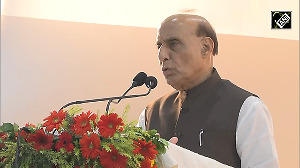The International Association of Athletics Federations (IAAF), holding a council meeting in Berlin, said the shot put competition for both men and women would take place in Olympia before the start of the main athletics programme, which will be staged in the Olympic stadium in Athens.
The proposal is now subject to the approval of the International Olympic Committee (IOC) at its scheduled meeting in Lausanne on December 4 but IAAF president Lamine Diack said that would be a formality.
"There will not be any problems at all with the IOC because they told the Athens organisers that all they needed was the green light from us," he said.
"This will be a tremendous opportunity to show a worldwide audience the purity and excitement of athletics competition in a sacred setting," he added. "The shot put may now become one of the highlights of the Games."
The shot put is not the most glamorous discipline but one with a long tradition in the Games and will be the only event, apart from soccer, which is spread throughout the country, to be staged outside the Athens area.
Athens organisers and the Greek Ministry of Culture face a battle with local archeological authorities, who want the historical site of Olympia to be preserved but Athens 2004 president, Gianna Angelopoulos-Daskalaki said in a statement: "The staging of the shot put event in the ancient Olympia stadium is an historical moment for the Olympic movement.
"We are in a position to say that the Games are making a symbolic and an actual return to their grass-roots."
Nestled among lush olive groves and Cypress trees, Olympia nowadays is a far cry from the bustling ancient Greek sports capital which was the site of the first Games.
Olympia hosted the ancient Games every four years from at least 776 BC until they were banned in 393 AD by the Roman Emperor Theodosius who declaimed them as a pagan festival.







